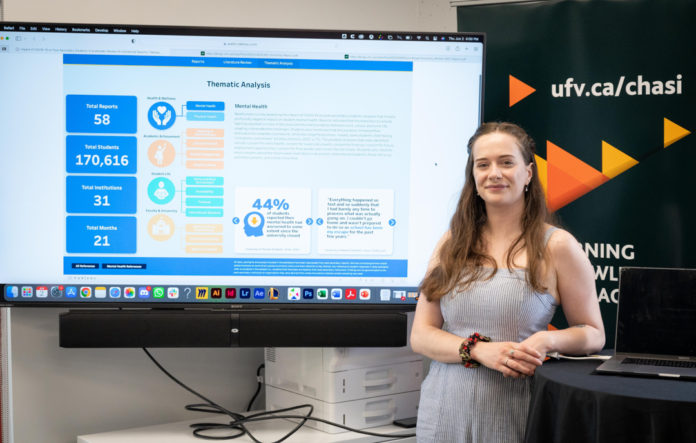Recently, the Community Health and Social Innovation (CHASI) hub of UFV completed a project in association with the British Columbia Council on Admissions and Transfer (BCCAT). The project is a dashboard that operates as an open access repository of student COVID-19 impact surveys.
Larissa Kowalski, a lead researcher, and Greg Laychack, visual project specialist, lead the team and assisted with coordinating this project. According to Kowalski, “The C in CHASI may stand for community, but it may as well stand for collaboration too. A considerable amount of collaboration, commitment and persistence has gone into building the dashboard.” This project began in the summer of 2021 and has only come to a conclusion within the last few weeks. It required a great deal of perseverance and cooperation to complete.
Ekaterina Marenkov, an assistant researcher, worked with other students and team members to aid in the production of the written aspect of the dashboard. Marenkov stated that “this included writing a literature review regarding the effects COVID-19 has had on post-secondary students, and a thematic analysis of all the student surveys conducted by post-secondary institutions and/or student unions.”
Though Marenkov worked very hard in the research and writing aspect of the project, that is only one part of it. She mentioned, “My tech and artistic skills do not extend beyond writing and researching. This is just to say, I did not partake in the [visual] development of the dashboard. That magic was all created by my talented co-worker, Mara Haggquist.” Haggquist is the graphic design intern of CHASI and was the lead when it came to designing and creating the dashboard.
According to Marenkov, much of the research was found to be relatively consistent with her and other fellow students’ experiences during the pandemic. In their findings it was nearly unanimous that the sudden shift to online learning had detrimental effects on students’ physical and mental health. Marenkov noted that “there were also some fascinating deviations across institutions with respect to student perceptions of institutional responses to COVID-19, their experiences with navigating online-learning platforms, and challenges associated with personal living situations.”
CHASI itself is a group that has been created with the intention of creating a physical place where data and research can be fostered into innovation and action. The group supports the social, mental, emotional, physical, and economic health of our local communities. Kowalski said, “I think what is incredibly special about CHASI is that our students bring both their personal and professional selves to their work, which creates a powerful nexus for learning and growth. The passion and conviction they bring to their work at CHASI inspires me every day,” when talking about the significance of the group.
Students are invited to get involved with the team and future projects. CHASI provides a place where students can make an active difference in the world and find a sense of comfort in the disarray they sometimes find themselves in. Students can contact Dr. Martha Dow, director of CHASI, at martha.dow@ufv.ca or thehub@ufv.ca for more info on how they can join or support CHASI.
Emmaline is working on her BA and ambitions to become an English teacher. They always say, those who cannot do, teach. She spends her free time buying, reading, and hoarding books with the hope that one day she will have no furniture and instead only have piles of books.



